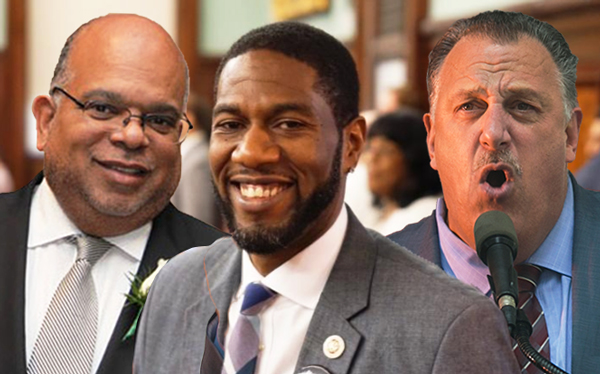Trending
Controversial construction safety bill gets Council approval
Measure will require hardhats to get at least 40 hours of training

After months of sparring between union and nonunion groups, the City Council on Wednesday approved a construction safety bill that will require workers to undergo at least 40 hours of safety training. It’s a bill that critics from the real estate industry have argued would paralyze construction.
The legislation, termed Intro 1447, aims to address the escalation of construction-related deaths over the past few years — a cause that both union and nonunion groups have stressed that they support. But even after going through several revisions, the measure has drawn criticism from nonunion groups and developers for, they say, unfairly favoring union labor.
From 2015 through September 2017, there’ve been more than 40 deaths at construction sites in the city. The Building and Construction Trades Council has repeatedly pointed out that a majority of those fatalities have occurred on nonunion sites. The Real Estate Board of New York (REBNY) And Others Have Countered That The Construction Accidents Often Take Place at smaller projects that are 10 stories or less.
The urgency to address the dangers of construction are ever present. Last week, one day after a City Council committee unanimously approved the bill, two construction workers fell to their deaths at separate sites in Manhattan within hours of each other. One of the deaths occurred at Brookfield Property Partners’ 1 Manhattan West, which is a union-run project. The other, at Fortis Property Group’s 1 Seaport, which uses nonunion labor.
The bill requires workers to complete a 40-hour training course by December 2018 — or September 2020, if the Department of Buildings determines that there aren’t enough training facilities available for workers to meet that deadline. By March 2018, workers have to complete the equivalent of OSHA 10, a 10-hour course sponsored by the Occupational Safety and Heath Administration. Workers will then complete an additional 30 hours of training, and then the DOB will determine an additional 10 to 25 hours. At least eight of those hours will pertain to the dangers of falling workers and objects at construction sites, according to the bill. Workers who’ve undergone such training or completed a 100-hour training course (often seen in apprenticeship programs) in the past five years are exempt from undergoing the additional training.
“We addressed all of the issues that were brought to us, union, nonunion, REBNY, day laborers,” Council Member Jumaane Williams, the bill’s sponsor, said before the vote. “This was not a rushed job.”
Williams also criticized REBNY for not being a better partner leading up to the bill’s passage. He called the organization “disreputable” and said it promoted false information.
“Every step of the way, they grumbled, they complained [and] they lobbied,” he said.
REBNY and other organizations have criticized the bill, saying that it will be disproportionately difficult for minority workers to meet the new requirements. The bill includes some incentives for developers to pay for the training, but contractors are still expected to shoulder some of the costs.
“It’s unfortunate that Council member Jumaane Williams resorts to name calling and more unfortunate that he can’t answer basic questions about the bill,” REBNY said in a statement. “How will tens of thousands of workers access safety training? How will they pay for it?”
Gary LaBarbera, president of the Building and Construction Trades Council of Greater New York, said real estate’s question of who pays is a really a non-question. “The answer for me always was: If you’re so concerned about who’s going to pay for it, these workers you’re so worried about, well then you pay for it,” he said. “Obviously, they have the resources to pay for it. I think that’s what a responsible industry does.”
The measure also calls for the creation of a 14-person task force, appointed evenly by the mayor and the City Council speaker. The group will consist of representatives of union workers, nonunion workers and minority- and women-owned businesses.
In a press conference before the Council meeting, Speaker Melissa Mark-Viverito said that debate over the bill eventually needed to cease and the council needed to take action.
“We are not going to sit by as a legislative body,” she said, “and watch workers die.”




